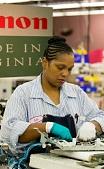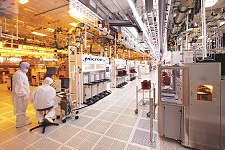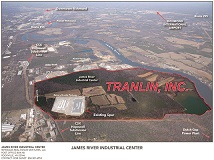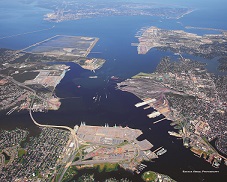

In today’s global economy, Virginia competes against 49 other U.S. states and countries around the world on a daily basis. The Commonwealth continues to preserve a centuries-old legacy and expand its standing as a leading state for business.
While independent third parties have noted the benefits of conducting business in Virginia, the testaments of the corporations that call Virginia home demonstrate the Commonwealth’s leadership position. The Commonwealth serves as the headquarters for 35 Fortune 1000 firms, and 52 firms with annual revenue over $1 billion are headquartered in Virginia. The success of Virginia businesses such as Stihl, Northrop Grumman, DuPont, Micron, Canon, Lipton and MeadWestvaco is the best indicator of what can be accomplished in the Commonwealth. The prestige and diversity of companies that join or continue to grow in Virginia — Rolls-Royce, Amazon.com, Microsoft, Bechtel, Tranlin, Inc., K2M, Corporate Executive Board, Continental and Stone Brewing Co., to name a few — demonstrate the Commonwealth’s ability to attract leading companies across different sectors.

The benefits of Virginia’s east coast location are enhanced by its transportation infrastructure. Virginia has the third-largest state-maintained transportation network in the country, with six major interstate highways providing access to approximately 41 percent of the U.S. population that falls within a one-day (10-hour) drive of Virginia. Fourteen railroads operate on more than 3,700 miles of railway, and 14 commercial airports serve Virginia, including Washington Dulles International Airport, another international gateway in the Commonwealth that provides non-stop flights to any continent in the world.
The Port of Virginia is the only port on the U.S. East Coast currently capable of handling post-Panamax ships as first and last port of call. With 50-foot channels and authorization up to 55 feet, the Port of Virginia offers the deepest shipping channels on the U.S. East Coast, able to accommodate ships greater than 10,000 TEUs (twenty-foot equivalent units). The Port of Virginia is vital to international businesses that depend on Virginia's ports for worldwide access to the marketplace.
The Commonwealth also offers a strong education system and a dynamic workforce — both of which provide a solid foundation for growth that makes Virginia a great place for a global enterprise. Virginia is among the most educated states in the country, with more than 575,000 students enrolled in over 100 in-state institutions of higher education. Virginia’s higher education system, the eleventh-largest in the nation, also hosts 23 community colleges with transferrable programs across the state that partner with companies to offer customized workforce training programs. A tradition of lifelong education means that Virginia’s workforce is consistently prepared for changing technologies, delivering a pipeline of skilled applicants for companies today and for industries of the future.

Virginia’s economic diversity and resiliency are its strengths. A diverse economy is critical to attracting and growing jobs of the 21st century. The biomass, automotive, food and beverage, and aerospace industries represent robust business clusters in which the Commonwealth possesses unique advantages.
Information technology is not simply another industry in Virginia, it is central to the success of the Commonwealth. With one of the highest concentrations of technology workers in the country, Virginia has become a world-class center for emerging Internet technology, software development, fiber optics and advanced communications companies. Virginia’s IT industry accounts for more than 172,000 employees at IT companies and provides a total estimated 277,000 IT-related jobs, as reported by Cyberstates 2015. IT has a direct economic output of $41.3 billion and supports $33.4 billion in additional economic output in Virginia. In the past 10 years, over 70,200 jobs have been added in this important sector with investments of more than $12.3 billion from companies such as Cvent, Digital Realty Trust, DOMA Technologies, Micron and Microsoft, among others.
Advanced manufacturing is a key growth sector for the Virginia economy, driving technology, productivity and innovation across all its industry sectors. Nearly every region of the Commonwealth relies on manufacturing operations as part of its overall economic base. Shipbuilders, automotive suppliers, machinery and equipment manufacturers, food processors, aerospace suppliers, semiconductor fabricators, plastics, wood products and chemicals all help compose a diverse manufacturing base in Virginia.

The Commonwealth offers a variety of performance-based business incentives, including tax credits, exemptions and grants. Virginia views incentives as an investment in its economic future and as a basis for a rational business decision for both the Commonwealth and the companies.
For Virginia to continue to lead in the global marketplace, economic development partners must work together to make the Commonwealth even more attractive to companies that are creating the jobs of the future. The Commonwealth boasts a rich history and even richer assets. Virginia continues to pioneer innovation, crafting contemporary programs that bolster economic development performance for the 21st century.

